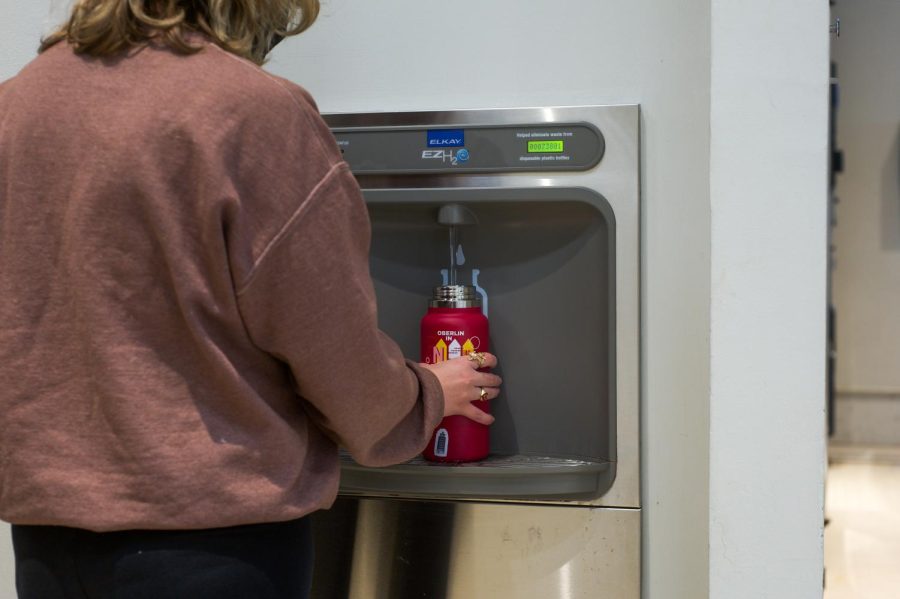Water Bottle Debate Reveals Plastic Environmentalism
Oberlin College banned bottled water on campus in 1999, but has since overturned its decision. Now, bottled water can be purchased at several dining locations across campus for Flex Dollars or meal swipes.
Chances are you’ve seen them littered under trees, cresting over the tops of bulging trash bags, or flying in the wind across Wilder Bowl as a sort of ankle-seeking missile of rubbish. Like cigarette butts and DeCafé receipts, plastic water bottles are a ubiquitous eyesore, a commodity that stocks fridges across campus to the brim, just for students to grab, drink, then throw away. Much of our waste is inescapable; unfortunately, in our capitalist, consumption-centered society, the systems that produce and dispense food and materials are inherently unsustainable. Yet, plastic water bottle use is easily avoidable and the first rung on the ladder of reducing waste that we can easily scale as a student body. Oberlin has water fountains and bottle refill stations in almost every building on campus. Water bottles are cheap and available; the water bottle I use from the Free Store remains the best one I’ve had. Alternatives to disposable bottle use are extremely accessible, both financially and in terms of infrastructure.
Oberlin’s historical relationship with plastic water bottles is complicated and, like most discourse on campus, extremely charged. According to an Earth Day Q&A with the Office of Environmental Sustainability conducted in 2015, Oberlin banned bottled water in 1999, spurred by a student initiative. Yet the ban did not last, and a 2010 campus-wide movement called for the ban of plastic water bottles again, culminating in a motion passed in the Student Senate when dining services were still under Bon Appétit Management Company. From numerous opinion pieces in the Oberlin Review during that time, the discourse surrounding bottled water was divisive; many called for an end to their sale not only based on environmental grounds, but also out of protest for the inherent inequalities that commercialized water presents to society. Some disagreed; Andrew Lipian, OC ’12, condemned the Student Senate’s ban in an article titled “Pro-Choice When It Comes to Bottled Water,” citing concerns for the local business that supplied bottled water to Oberlin and expounding upon free market ideals.
Now we are over a decade past these debates, and arguments like these hold no water. Much of our bottled water is supplied by large corporations like Dasani (owned by Coca Cola) and Aquafina (owned by PepsiCo), and there is high demand from the student body. AVI Foodsystems would be all too happy to get rid of them, if not for the Oberlin community’s continued reliance on convenience. In a meeting as part of my job with the Office of Environmental Sustainability, Director of Operations of AVI Foodsystems Lilkeisha Smith explained that, when AVI took away plastic water bottles, it received significant backlash from Oberlin students. It came to the point where AVI received hate mail for its decision to eliminate plastic water bottles, and, under pressure, continued providing them. This is unacceptable.
Many calls for individual actions toward waste and climate change have been met with trite arguments blaming corporations. Some people attempt to absolve themselves of guilt by placing the entirety of the earth’s problems on abstract, unspecified companies. Corporate plundering has indeed been the main cause of our current environmental state, but the relationship between corporations and individual choices is more mutual than we might think. Companies supply goods, and we as consumers buy and use them. Instead of immediately accusing those who call for a more sustainable lifestyle as moral high-grounders, let’s instead take an honest look at what we can do individually and as Obies to truly commit to a green lifestyle. Plastic water bottles are perhaps the easiest way to reduce our consumption; they are, quite literally, within our reach.
Of course, banning bottled water doesn’t solve sustainability issues on campus. A multi-faceted approach to sustainability is required to transform our campus in conjunction with the ideals we hold, and much of this work is already being done by various departments and workers. In fact, AVI has made significant strides in sustainability this past year, eliminating disposable to-go boxes, some single-use plastics at Stevenson Dining Hall, and discussing composting options with Oberlin Environmental Services. AVI’s transition away from disposables used for the past two years back to all reusable dishes is largely being hampered by the student body. As Smith explained in our meeting, students take plates and cups from the dining halls, which quickly go missing, or are unretrievable due to food safety rules. But these are other problems that will be addressed; bottled water use is the easiest, most achievable disposable to curb use of. What remains in terms of sustainability on campus is largely governed by what we choose to do as the student body of this campus. We must intentionally choose what we consume, encourage others to do so as well, and collectively campaign against the use of bottled water. If not, we’re only further supporting the sustainability pantomime that the Oberlin student body has become.





